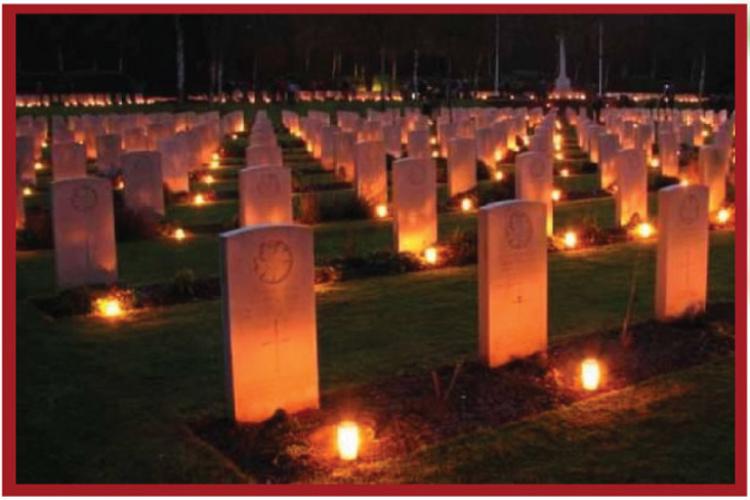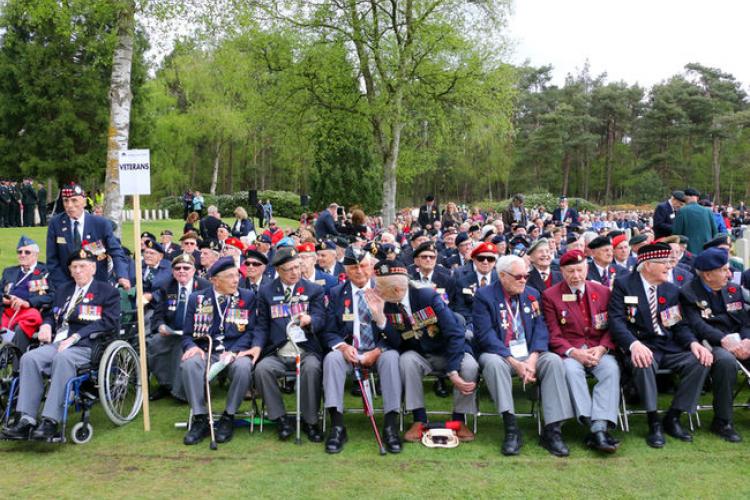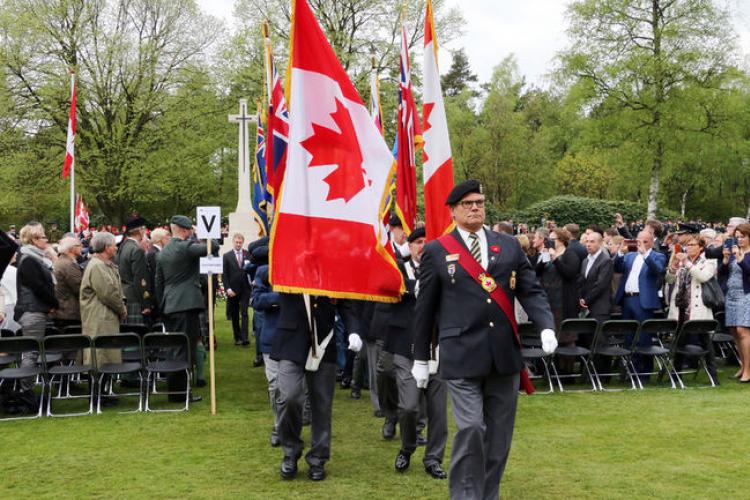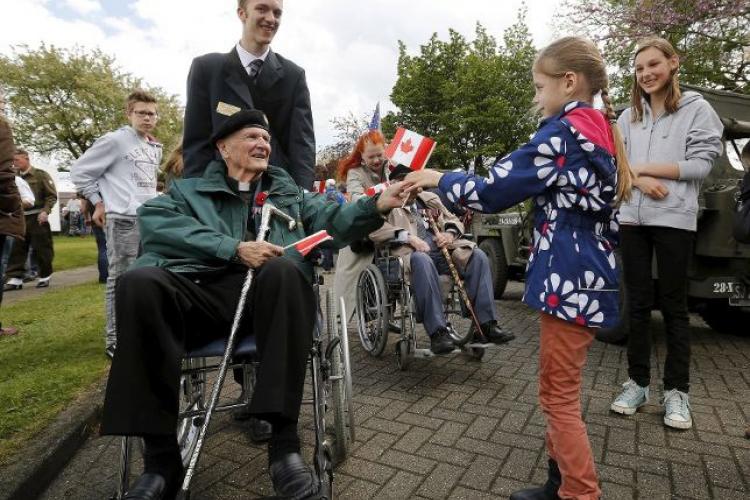THE STORY OF HOLTEN WAR CEMETERY
At this cemetery for the past 70 years, officials of the Dutch Government, a member of the Dutch Royal family along with the citizens of the town of Holten have gathered on The Day of the Dead – May 4th. Also in attendance are officials from Canada and our Canadian veterans but 2015 may have been the last time our veterans will have been in attendance.
The crowd that gathered in Holten included many Dutch children who were addressed by Gert Jan Oplaat in a moving speech. Click on the link below to hear what he said.
Holten Cemetery 4 May 2015 (translated)
Ladies and gentlemen, dear veterans, allow me to do my speech in Dutch because they asked me to talk to the young children.
Girls and boys.
How amazing that you are all here today. There are many different people here. Our Princess Margriet and her husband Prince Pieter van Vollenhoven, the Prime Minster of Canada, Stephen Harper, and other important people.
But the most important people are naturally the old Canadian soldiers we call veterans. These people are already very old; many of whom are more than 90 years.
Unfortunately, many other Canadian soldiers were not able to grow old. They fell during the liberation of the Netherlands. 1400 young soldiers are buried here in Holten.
Dear boys and girls, I would like to ask you a question. How many of you watched the VoiceKids? (Similar to Canadian Idols for kids)
There were 5 boys and girls in the finals.
Robin, Rédouan, Joy, Robine en Lucas.
Who won? Lucas, that is right.
Who supported Lucas? Oh...some of you supported others.
Great that you can chose who you want to support, that you can say who you think is the best.
We have the Canadian soldiers and our veterans to thank for that. If they had not come to the Netherlands we would not have been able to chose who we liked the best, would not have been able to go on vacation in another country, and not even been able to chose our own friends.
Because in the war, when the Germans were playing the boss here, they said who you could or could not play with. It was dangerous to chose who you were going to play with. You could do nothing and had to stay inside in the evenings. You were not allowed to go to soccer or field hockey.
If the VoiceKids had been around then you would not have, for example, been able to participate if you had dark hair. You would not even have been able to chose what music you like.
Our grandma's and grandpa's were frequently scared and wanted the Germans to leave. But yes, they did not do that on their own.
Fortunately, 70 years ago, the Canadians came to the Netherlands. They fought the Germans and made it possible for our grandma's and grandpa's to be free. They made it possible for you to chose who we play with and who we support on the VoiceKids.
War is horrible, especially if you hear the stories of the old soldiers who survived.
I came here frequently as a child, together with Russell Jackson, a Canadian soldier that had survived the war.
We walked together along the graves of different soldiers. Stone for stone, we read the names and ages of every soldier. 18 years old, 21 years old, 25...19...18...All young people that would never live out their dreams.
Russell took my hand and squeezed it hard, so hard that it almost hurt. He started to cry and told me a story about what he had survived as a soldier. He asked me to share this everywhere to make sure people know that this must never happen again.
Russell was one of the first group of soldiers to come from Warnsveld near Zutphen. He was on his way with more than twenty other soldiers under the command of Lieutenant Higgins. At Groot Graffelt they stumbled upon a large company of German soldiers. Almost half of his friends were shot dead, including Lieutenant Higgins, leaving him as the sergeant in command.
After a number of heavy battles many of the Germans were forced to flee. Those few left behind hid behind the large beech trees at Hotel Het Jachthuis, just before Warnsveld. Suddenly the Germans came towards them yelling, crying and shooting.
It turned out to be the German SS-jugend, SS-youth. They also had to fight. But their uniforms were way too big. They could hardly hold up their weapons because of the weight. And they were totally drunk. They were drunk on German Gin, forced to drink by their bosses so that they would not be scared of the Canadians.
Russell found this to be the most difficult moment in his life and that moment stayed with him the rest of his life. But at the time Russell could not process it. Each year, crying, Russell would tell me again that he had to command his unit to shoot...shoot children 14, 15,16 years old...
German children also lost their lives in the fight, children without mothers or fathers, children who were forced to get drunk and who had no other choice.
Russell relived the war everyday in his head. Every night Russell woke from nightmares about it.
Russell's friend, Lieutenant Higgins, is buried here in Plot 1 Row H Grave 5. Go and visit it later.
Boys and girls, such horrible things happen in war. But thanks to the brave Canadian soldiers that is the past. When we are finished here with this ceremony, walk to the soldiers that are still here, the men with all the medals on their coats, give them your hand, a hug and say, "Thank you for our freedom".
When the next season of the VoiceKids starts again, think about today and think...fortunately I can chose who I want to support. That is freedom.
Thank you.
HOLTEN CANADIAN WAR CEMETERY
“DODENHERDENKING”
DAY OF THE DEAD
MAY 4, 2015
The year 2015 marked the 70th anniversary of the end of the Second World War in the Netherlands. I was honoured as a Canadian to be invited to attend this emotional ceremony at Holten Canadian War Cemetery. The Royal Canadian Legion Branch 0005 obtained seats for us and we are thankful for their assistance.
It so happened that Sid Bruinsma and I had been in France and Belgium for the previous two weeks doing research and photography on a book I am writing about the men and women from Huron County in Ontario who paid the supreme sacrifice during World War I. They number 497.
Our time in Holland was spent visiting the graves of the fallen of World War II from Huron County who rest in the cemeteries of the Netherlands. We placed the Canadian flag, the Canadian Ensign of that time and the Ontario flag at each headstone and we photographed their headstone.
The morning of May 4, 2015 was warm, sunny, clear and was going to be such an amazing day. Sid and I set out, found our way to Holten and immediately got lost. We had no idea where we were or where we had to go to. I spotted a vehicle across the road behind us so I approached these two men and explained who we were and what we were trying to do. They said they would call their Headquarters and it turns out these men are special security police. They said that we should follow them, which we did, and in a few minutes, we were parking at this magnificent hotel in the middle of a forest. We were taken inside and greeted and introduced to everybody. We were then offered tea and coffee and we noticed the while linens and the silverware. Upon some questions and the following conversation, we came to realize that these people thought we were with the official party of Prime Minister Harper and Her Royal Highness Princess Margriet and Professor Pieter van Vollenhoven. We explained that was not the case and that we were just two ordinary Canadians trying to find the parking lot so we could take a bus to Holten Canadian War Cemetery for the upcoming ceremony. Shortly after that we saw a man with a mirror on a stick checking the seats we were sitting in and then they explained that the official party was on their way. We asked how should we leave the hotel as we had reserved seats at Holten for the upcoming ceremony. They phoned ahead and we left by the entrance road and travelled the wrong way down this road, past the security posts (who by the way saluted as we drove by) to the station. Here we got on a bus which took us directly to the cemetery.
We had been at Holten Canadian War Cemetery the previous day and it had been quite peaceful even as they were getting ready for the ceremonies of the next day. On this day, there was the sound of the pipes and drums, there were hundred and hundred of people, there were veterans of World War II and all seemed to be exited and anticipating the upcoming events.
We decided that perhaps we had better figure out just where it was we would be sitting and this took a few minutes and we were comfortable in knowing we did have seats.
We then began to look around and I will explain what I saw and felt. There were youth there, both Dutch and Canadians and some of them were accompanying our veterans to the graves of their comrades of so along ago. For me this was emotional and very meaningful. The respect and the awe from these young folks to our veterans was remarkable. We were there when one veteran was at the grave of a pal and overcome by emotion this man of honour fell to the ground and we heard later in the day he had passed away. Perhaps his pals of long ago were calling him and it was time to go.
We saw many Canadian school children from Canada who had come to the Netherlands with their class to be part of this important ceremony. We also noticed that each one of the 82 Canadian units who liberated the Netherlands was represented.
Prime Minister Harper, Her Royal Highness Princess Margriet and Professor van Vollenhoven had arrived and there was much talking now because we all knew the ceremony was drawing near.
After a few minutes we again heard the skirl of the pipes and we knew the moment was at hand. Everyone rose to their feet en masse as the official colour party entered the gates of the cemetery with the Canadian flag leading the way. Pride is what I was feeling at that moment and it was a good feeling. Shortly following this the national anthems of both countries was played and it felt good to sing the Maple Leaf.
Prime Minister Harper in his speech mentioned a soldier who was killed in January of 1945 while with the Lincoln and Welland Regiment following the Battle of Kapelsche Veer. This soldier was then buried on the banks of the Maas River in a battlefield grave. In the ensuing chaos of war, the final resting place of this man was lost and he became one of thousand of unmarked graves. That is until June 1914 when two men with metal detectors located his remains.
Private Albert Laubensteins will now be remembered and honoured each year along side his fallen comrades.
Prime Minister Harper said “The heroes who liberated the Netherlands, like the men and women who serve our country today understood that when there arises a great evil, a threat to all of the things that define our existence as a free and just people, such enemies must be confronted.” He further stated that “what is right often comes at a great price – but at a cost that must be paid.” Continuing he also stated “when tyranny threatens the free, when cruelty torments the innocent, when desperation overwhelms the human spirit, we choose to respond, we choose the high road forward, not the easy way out. We choose risk not for reward, but for righteousness, we choose to fight for freedom, we choose to defend the innocent and we choose to bring hope to the world.” In closing he said “Canadians will never forget the welcome our troops received in this country as the war ended. Canadians will never cease to marvel at how this starving and scarred land so quickly became the prosperous, progressive and generous country that we know today, a partner is so many things.”
The next speaker was a man from the Netherlands who told the audience that he was going to speak to the youth of the Netherlands in Dutch. Please read that narrative below.
Following the speech to the youth, those very youth rose and placed a small bouquet of flowers at each of the 1,350 Canadian graves. As I watched these young people, I saw respect as each young person bowed his head after placing the flowers. They were serious and solemn.
Then in the distance those of us who understood heard a sound that coming nearer. It was the sound of a Merlin engine and as we looked a Spitfire came into view and did a pass directly over our Canadians and on his second pass performed the Victory roll.
Next sound we heard was that of a military helicopter that came into view very low and as it passed over the people below 1,000s of poppies began to fall from the sky.
Both Sid and myself were honoured to be at this event which was one of many taking place throughout the Netherlands. In all likelihood, this would be the last such event at Holten and other locations. Shortly, there will not be any surviving veterans of World War II.
It seems to be the tradition since 1944-1945 that the cities, town and villages of the Netherlands celebrate two Liberation Days each year. The first is when the Canadians actually liberated a city, town or village and the second is the National Liberation Day which is celebrated on May 5th.
Holten was liberated by forces of the 2nd Canadian Infantry Division on April 8-9, 1945. The Black Watch (Royal Highlanders of Canada along with Le Regiment de Maisonneuve of the 5th Infantry Brigade liberated Holten on April 8-9, 1945. The Black Watch casualties were 1 man killed with 9 wounded and the Maisonneuves had 3 killed and 22 men wounded. It was stated that here the enemy resistance was light must the German resistance grew as the 2nd Canadian Division pushed north toward Groningen.
.
For years our Men of Honour have come to visit their pals of so long ago and when they do they are pained because they remember what they endured and what the peoples of Holland endured but they also remember their comrades and for a short period they are young men again. You would have seen the tears and the shaking hand as they paused at a grave site.
Another tradition has been the children of the area place a bouquet of tulips at each of the 1,396 Canadian headstones on May 4th and when they do so they pause and bow their heads because they know and understand it was these young men who liberated their country in 1944-45. As well on Christmas Eve the whole of the town go to Holten Canadian War Cemetery and on this night they place wind resistant candles in front of each grave and they light them. In the darkness all one is able to see is the glow of 1,396 candles. The people do not and will not forget our Men of Honour.
We would like to share with you the brochure displayed below, which is based on material compiled by Terry Copp and Mike Bechthold. "The Canadian Battlefields in Northwest Europe 1944-45: A Visitor’s Guide (2005)" was a joint project of the Canadian Battlefields Foundation and Wilfrid Laurier University, Waterloo, Ontario, Canada.
For additional information, you may contact the authors at www.canadianmilitaryhistory.ca or www.canadianbattleofnormadyfoundation.ca. The authors gratefully acknowlege the assistance of the Directorate of Public Policy and the Directorate of History and Heritage, National Defence Canada and Veterans Affairs Canada in developing this historic document. Front and back cover photos are by Evert Stieber.
To view the full document in a pdf format, click here.




